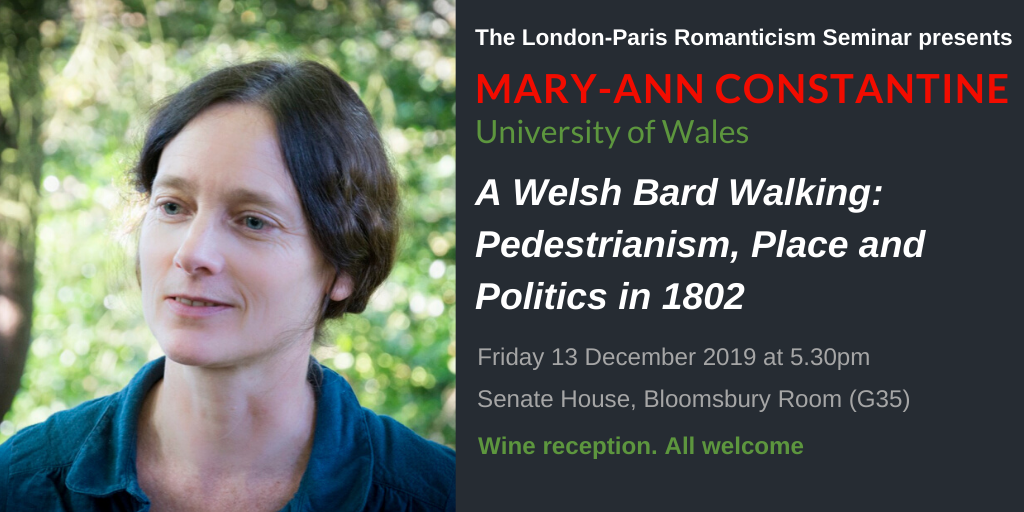
The next meeting of the London-Paris Romanticism Seminar will take place on Friday 13 December in the Bloomsbury Room (G35, ground floor) at Senate House, University of London, starting at 5.30. As our guest speaker, we are delighted to welcome Dr Mary-Ann Constantine of the University of Wales Centre for Advanced Welsh and Celtic Studies, who will present a paper entitled A Welsh Bard Walking: Pedestrianism, Place and Politics in 1802. This will be followed by a discussion and wine reception. The event is free and open to everyone, including postgraduates and members of the public. No booking is required.
Mary-Ann Constantine is Reader at the University of Wales Centre for Advanced Welsh and Celtic Studies. She researches the literature and history of Romantic-period Wales and Brittany, and has a particular interest in travel writing and in the cultural politics of the 1790s. With Dafydd Johnston she was general editor of the ten-volume series Wales and the French Revolution (2012-15). Other publications include The Truth Against the World: Iolo Morganwg and Romantic Forgery (2007) and (jointly edited with Nigel Leask) Enlightenment Travel and British Identities: Thomas Pennant’s Tours in Scotland and Wales (2017). She is currently completing a monograph entitled Curious Travellers: the Welsh Tour 1760-1820.
Regarding the subject of her talk, Mary-Ann writes:
“The ‘home tour’ became extremely popular in Britain in the 1790s and early 1800s, resulting in hundreds of written accounts, many of which have remained unpublished. Wales and Scotland were popular destinations, and both touring and reading tours shaped perceptions of these countries, their landscapes, histories and cultures, in a wider discourse of Britishness. Within an undeniably capacious genre (tour writers can be artists, naturalists, geologists, merchants, poets and antiquarians as well as holiday-makers) the accounts of pedestrians form a distinctive and often politically radical sub-group. This paper focuses on an unpublished account of a journey made on foot from London to Glamorgan in the summer of 1802 by the Welsh poet and radical, Edward Williams (Iolo Morganwg). An unsettled and unsettling text, haunted by the recent past, it sheds light on the politics of place in Romantic-era Britain as well as offering insight into the relationship between memory and motion.”
198 thoughts on “London-Paris Romanticism Seminar: Mary-Ann Constantine, Friday 13 December 2019, Senate House, University of London”
Comments are closed.